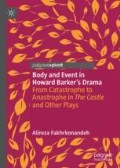Abstract
Howard Barker’s tragic theatre is preoccupied with the questions of religion, the divine, the sacred, nihilism, faith, and spirituality. Positing the death of God as the condition of possibility of his art of tragedy, and setting death and desire as its ontological premises, Barker’s drama manifests prominent metaphysical dimensions and concerns. This “a-theological”—and not atheist—approach, however, does not make him ignore God and the pivotal place He/it occupies in human history and personal-collective consciousness and unconscious. In this chapter, I will argue how Barker’s aporetic approach to the issues of metaphysics, God, and religion should be characterized in terms of a twofold method: deconstructionist and evental, rather than in terms of negative theology. The aporias, here, stem from the complex relationship between Law and Event. Tracing the pervasive presence and recurrent iterations of God, religion, sacred in various plays, it will be demonstrated how God, to Barker’s characters, is not merely a transcendental signified, but is rather indelibly interwoven with embodied experiences of pain, contradiction, and eroticism/desire. Crucially, this is evidenced by the fact that often the first steps taken by Barker’s characters (including Stucley) in their re-definition of their self are their re-definition of the nature or role of God in their world. Accordingly, this chapter takes as its focal point the subtle manners in which, in Barker, the transcendental-metaphysical (whether interpreted as God, realm of ideals, or spirit/soul) and the material-sensuous are depicted to be inherently linked. As is attested by Stucley’s revisionary re-writing of the Bible, pivoting on the moment (and/or act) of “sexuation” of the deity/god (Christ), Barker’s deconstructionist re-conception of the metaphysical/transcendental involves exposing the repressed material-bodily basis of it—including the female/feminine.
Access this chapter
Tax calculation will be finalised at checkout
Purchases are for personal use only
Notes
- 1.
For an extended characterization of the spirit of ressentiment see On the Genealogy of Morals 34, 39. Also see Deleuze’s Nietzsche and Philosophy, x, 116.
- 2.
See Schopenhauer, “Additional Remarks on the Doctrine of the Suffering of the World,” trans. E.F.J. Payne, 291–7.
- 3.
See Nietzsche, Human, All Too Human, §22 and 23.
- 4.
See Deleuze’s Nietzsche and Philosophy 10–11.
- 5.
For Levinas’ views on pain/suffering see Levinas, E. (1998a). “Useless Suffering.” In E. Levinas (Ed.; M.B. Smith and B. Harshav, trans.). Entre Nous: Thinking-of-the-Other (pp. 91–102). New York: Columbia University Press; for Nietzsche’s view on pain/suffering see Beyond Good and Evil (225), Thus Spoke Zarathustra (22–6, 46, passim) and The Genealogy of Morality (37–44).
- 6.
For an extended exploration of the role of touch and skin in Howard Barker’s drama see Alireza Fakhrkonandeh, “Noli Me Tangere” 2017.
- 7.
Margrit Shildrick, “Some Speculations on Matters of Touch,” The Journal of Medicine and Philosophy 26, no. 4 (2001): 402.
- 8.
See Merleau-Ponty, VI 235; and VI 137–8.
- 9.
Regarding the role and nature of spatiality and temporality in relation to Kristeva’s conception of chora (in contrast to Plato) see (RPL 25–6); also see West-Pavlov 45.
Author information
Authors and Affiliations
Corresponding author
Rights and permissions
Copyright information
© 2019 The Author(s)
About this chapter
Cite this chapter
Fakhrkonandeh, A. (2019). Aporias of Religion in Barker: God, Deconstruction, and the Re-writing of the Bible. In: Body and Event in Howard Barker's Drama. Palgrave Pivot, Cham. https://doi.org/10.1007/978-3-030-28699-6_4
Download citation
DOI: https://doi.org/10.1007/978-3-030-28699-6_4
Published:
Publisher Name: Palgrave Pivot, Cham
Print ISBN: 978-3-030-28698-9
Online ISBN: 978-3-030-28699-6
eBook Packages: Literature, Cultural and Media StudiesLiterature, Cultural and Media Studies (R0)

